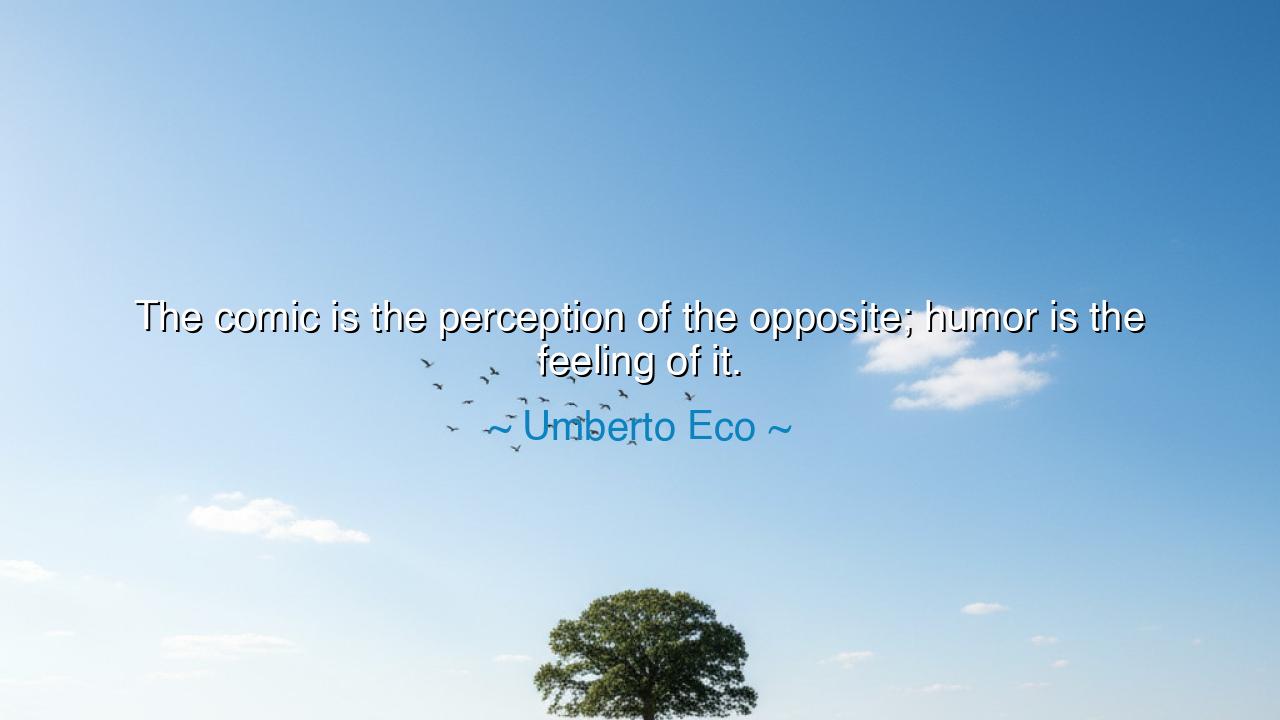
The comic is the perception of the opposite; humor is the feeling






When Umberto Eco wrote, “The comic is the perception of the opposite; humor is the feeling of it,” he carved a line between the mind and the heart, between thought and emotion. In this single sentence, he offered a map to understanding one of the deepest mysteries of the human spirit — the power of laughter, not just as reaction, but as revelation. The comic, Eco tells us, is born of intellect — it is when we see contradiction, irony, the clash between what should be and what is. But humor, he says, is more profound; it is when we feel that contradiction within ourselves — when laughter is not only a response, but a release, a sigh, a quiet surrender to the absurdity of life.
The ancients would have understood this distinction well. In the laughter of the comic, they would have seen the cleverness of the mind, the wit that delights in exposing folly. But in humor, they would have recognized the wisdom of the soul — a kind of laughter mingled with tears, born not from superiority, but from understanding. To perceive the comic is to observe; to feel humor is to participate. It is to look upon the world and see its chaos, yet love it still. The comic belongs to the intellect; humor belongs to compassion.
Consider, for example, the story of Charlie Chaplin, the silent poet of cinema. His films were filled with comedy — pratfalls, absurd situations, visual irony. Yet behind every gag, there was feeling: a tramp falling in love, a man starving but smiling, a dreamer stumbling through a cruel world. When the audience laughed at Chaplin, they were not mocking him; they were recognizing themselves in him. They were laughing not at the absurdity, but through it. This is humor as Eco describes it — the feeling of the opposite, the ache and the joy interwoven. The comic makes us laugh; humor makes us human.
In truth, the comic and the humorous are the twin faces of wisdom. The comic awakens the mind by revealing contradiction, by holding up a mirror where we see the ridiculousness of our own pretensions. But humor heals the heart — it allows us to accept contradiction, to live peacefully with it. The comic may say, “How foolish life is!” but humor whispers, “Yes, and how beautiful that foolishness can be.” It is this tenderness — the ability to smile gently at imperfection — that separates wisdom from cynicism, and the sage from the jester.
Umberto Eco, a scholar of semiotics and the labyrinth of meaning, understood that humor is not merely entertainment; it is interpretation. To laugh deeply is to read the world with empathy. For the world is full of opposites — good and evil, joy and suffering, creation and decay — and man, standing between them, must find a way to bear it all. Humor is that way. It is the art of living with paradox without despair. It transforms suffering into understanding, and misunderstanding into acceptance. Through humor, the heart becomes larger than the pain it carries.
The ancients taught that even the gods laugh. Not mockingly, but with the laughter of eternity — the laughter of those who see the whole pattern and know that even chaos has its place in the divine order. To feel humor, then, is to share in that divine vision, to hold joy and sorrow together in one breath. It is the laughter of the wise man who knows that fate is fickle, yet still raises his cup to the sky.
The lesson, then, is clear and eternal: learn to perceive the comic, but live through humor. Let your mind discern the ironies of life, but let your heart forgive them. Laugh not with scorn, but with tenderness. When the world contradicts itself — and it always will — do not grow bitter. Feel the absurdity, embrace it, and let laughter soften your understanding. For as Eco’s words remind us, the comic reveals the world’s contradictions, but humor teaches us how to live within them — gracefully, gratefully, and forever human.






AAdministratorAdministrator
Welcome, honored guests. Please leave a comment, we will respond soon